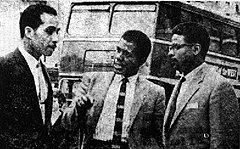Bristol Bus Boycott, 1963

Audley Evans, Paul Stephenson and Owen Henry, pictured in front of a 1960s Bristol bus
|
|
| Date | 30 April 1963 |
|---|---|
| Location | Bristol, England |
| Participants | Paul Stephenson, Roy Hackett, Owen Henry, Audley Evans and Prince Brown |
| Outcome | Employment of first non-white conductor, 17 September 1963 |
The Bristol Bus Boycott of 1963 arose from the refusal of the Bristol Omnibus Company to employ black or Asian bus crews in the city of Bristol, England. In common with other British cities, there was widespread racial discrimination in housing and employment at that time against "coloureds". Led by youth worker Paul Stephenson and the West Indian Development Council, the boycott of the company's buses by Bristolians lasted for four months until the company backed down and overturned the colour bar.
The boycott drew national attention to racial discrimination in Britain, and the campaign was supported by national politicians, with interventions being made by church groups and the High Commissioner for Trinidad and Tobago. The Bristol Bus Boycott was considered by some to have been influential in the passing of the Race Relations Act 1965 which made "racial discrimination unlawful in public places" and the Race Relations Act 1968, which extended the provisions to employment and housing.
Bristol in the early 1960s had an estimated 3,000 residents of West Indian origin, some who had served in the British military during World War II and some who had emigrated to Britain more recently. A large number lived in the area around City Road in St Pauls. They suffered discrimination in housing and employment, and some encountered violence from Teddy Boy gangs of white British youths. This community set up their own churches and associations, including the West Indian Association, which began to act as a representative body.
...
Wikipedia
